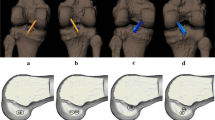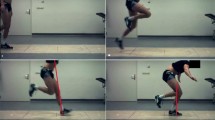Abstract
Purpose
The purpose of this study was to compare the early functional recovery using biomechanical properties between anterior cruciate ligament (ACL)- and posterior cruciate ligament (PCL)-reconstructed patients and to determine the biomechanical deficit of PCL-reconstructed patients compared to ACL-reconstructed patients.
Methods
A motion analysis system was used to measure and calculate kinematic and kinetic data for 10 patients who underwent PCL-reconstructed patients [experimental group (group 1)], 10 ACL-reconstructed patients (group 2), and 10 healthy subjects (group 3) during 45°, 90°, 135°, and 180° cutting and turn running tasks. Groups 1 and 2 were assessed at 3 (return to daily activity) and 6 months (return to light sports) postoperatively.
Results
At 3 months postoperatively, compared to groups 2 and 3, group 1 showed a decrease in knee flexion angle, extension moment, valgus moment, external rotational moment, ground reaction force, and increased hamstring–quadriceps ratio. At 6 months postoperatively, results from group 1 resembled those of groups 2 and 3 over time.
Conclusions
Patients who underwent PCL reconstruction showed some biomechanical deficits in performance of activities requiring rotation, compared to those who underwent ACL reconstruction. Therefore, the modification of a rehabilitation programme for patients who underwent PCL reconstruction would be necessary for improvement of the biomechanical properties during performance of dynamic activities.
Level of evidence
Case–control study, Level III.






Similar content being viewed by others
References
Ahn JH, Lee YS, Chang MJ, Kum DH, Kim YH (2009) Anatomical graft passage in transtibial posterior cruciate ligament reconstruction using bioabsorbable tibial cross pin fixation. Orthopedics 32:96
Bell AL, Pedersen DR, Brand RA (1990) A comparison of the accuracy of several hip center location prediction methods. J Biomech 23:617–621
DeVita P, Hortobagyi T, Barrier J (1998) Gait biomechanics are not normal after anterior cruciate ligament reconstruction and accelerated rehabilitation. Med Sci Sports Exerc 30:1481–1488
Edson CJ, Fanelli GC, Beck JD (2010) Postoperative rehabilitation of the posterior cruciate ligament. Sports Med Arthrosc 18:275–279
Fanelli GC (2008) Posterior cruciate ligament rehabilitation: how slow should we go? Arthroscopy 24:234–235
Fanelli GC (2006) Surgical treatment of lateral posterolateral instability of the knee using biceps tendon procedures. Sports Med Arthrosc 14:37–43
Goudie EB, Will EM, Keating JF (2010) Functional outcome following PCL and complex knee ligament reconstruction. Knee 17:230–234
Grassmayr MJ, Parker DA, Coolican MR, Vanwanseele B (2008) Posterior cruciate ligament deficiency: biomechanical and biological consequences and the outcomes of conservative treatment. A systematic review. J Sci Med Sport 11:433–443
Hewett TE, Myer GD, Ford KR (2006) Anterior cruciate ligament injuries in female athletes: part 1, mechanisms and risk factors. Am J Sports Med 34:299–311
Houck JR, Duncan A, De Haven KE (2006) Comparison of frontal plane trunk kinematics and hip and knee moments during anticipated and unanticipated walking and side step cutting tasks. Gait Posture 24:314–322
Irrgang JJ, Fitzgerald GK (2000) Rehabilitation of the multiple-ligament-injured knee. Clin Sports Med 19:545–571
Jackson WF, van der Tempel WM, Salmon LJ, Williams HA, Pinczewski LA (2008) Endoscopically-assisted single-bundle posterior cruciate ligament reconstruction: results at minimum ten-year follow-up. J Bone Joint Surg Br 90:1328–1333
Jung YB, Jung HJ, Kim SJ, Park SJ, Song KS, Lee YS, Lee SH (2008) Posterolateral corner reconstruction for posterolateral rotatory instability combined with posterior cruciate ligament injuries: comparison between fibular tunnel and tibial tunnel techniques. Knee Surg Sports Traumatol Arthrosc 16:239–248
Jung YB, Jung HJ, Tae SK, Lee YS, Lee KH (2005) Reconstruction of the posterior cruciate ligament with a mid-third patellar tendon graft with use of a modified tibial inlay method. J Bone Joint Surg Am 87(Suppl 1):247–263
Jung YB, Jung HJ, Tae SK, Lee YS, Yang DL (2006) Tensioning of remnant posterior cruciate ligament and reconstruction of anterolateral bundle in chronic posterior cruciate ligament injury. Arthroscopy 22:329–338
Landry SC, McKean KA, Hubley-Kozey CL, Stanish WD, Deluzio KJ (2007) Neuromuscular and lower limb biomechanical differences exist between male and female elite adolescent soccer players during an unanticipated run and crosscut maneuver. Am J Sports Med 35:1901–1911
Lee YS, Ahn JH, Jung YB, Wang JH, Yoo JC, Jung HJ, Kang BJ (2007) Transtibial double bundle posterior cruciate ligament reconstruction using TransFix tibial fixation. Knee Surg Sports Traumatol Arthrosc 15:973–977
Lee YS, Kim NK (2011) Rehabilitation after posterior cruciate ligament reconstruction. Minerva Orthop Traumatol 62:291–295
Lee YS, Kim SK, Park JH, Park JW, Wang JH, Jung YB, Ahn JH (2007) Double-bundle anterior cruciate ligament reconstruction using two different suspensory femoral fixation: a technical note. Knee Surg Sports Traumatol Arthrosc 15:1023–1027
Lee YS, Lim BO, Kim JG, Lee KK, Park HO, An KO, Ryew CC, Kim JH (2011) Serial assessment of knee joint moments in posterior cruciate ligament and posterolateral corner reconstructed patients during a turn running task. Arch Orthop Trauma Surg 131:335–341
Lim BO, Lee YS, Kim JG, An KO, Yoo J, Kwon YH (2009) Effects of sports injury prevention training on the biomechanical risk factors of anterior cruciate ligament injury in high school female basketball players. Am J Sports Med 37:1728–1734
Lim BO, Lee YS, Kim JG, An KO, Yoo J, Kwon YH (2009) Effects of sports injury prevention training on the biomechanical risk factors of anterior cruciate ligament injury in high school female basketball players. Am J Sports Med 37:1728–1734
Noyes FR, Barber-Westin SD, Albright JC (2006) An analysis of the causes of failure in 57 consecutive posterolateral operative procedures. Am J Sports Med 34:1419–1430
Osternig LR, Bates BT, James SL (1980) Patterns of tibial rotary torque in knees of healthy subjects. Med Sci Sports Exerc 12:195–199
Segawa H, Omori G, Koga Y, Kameo T, Iida S, Tanaka M (2002) Rotational muscle strength of the limb after anterior cruciate ligament reconstruction using semitendinosus and gracilis tendon. Arthroscopy 18:177–182
Sell TC, Ferris CM, Abt JP, Tsai YS, Myers JB, Fu FH, Lephart SM (2007) Predictors of proximal tibia anterior shear force during a vertical stop-jump. J Orthop Res 25:1589–1597
Shelbourne KD, Klootwyk TE, Wilckens JH, De Carlo MS (1995) Ligament stability two to six years after anterior cruciate ligament reconstruction with autogenous patellar tendon graft and participation in accelerated rehabilitation program. Am J Sports Med 23:575–579
Shelbourne KD, Nitz P (1990) Accelerated rehabilitation after anterior cruciate ligament reconstruction. Am J Sports Med 18:292–299
Shelbourne KD, Nitz P (1992) Accelerated rehabilitation after anterior cruciate ligament reconstruction. J Orthop Sports Phys Ther 15:256–264
Solomonow M, Baratta R, Zhou BH, Shoji H, Bose W, Beck C, D’Ambrosia R (1987) The synergistic action of the anterior cruciate ligament and thigh muscles in maintaining joint stability. Am J Sports Med 15:207–213
Stergiou N, Ristanis S, Moraiti C, Georgoulis AD (2007) Tibial rotation in anterior cruciate ligament (ACL)-deficient and ACL-reconstructed knees: a theoretical proposition for the development of osteoarthritis. Sports Med 37:601–613
Timoney JM, Inman WS, Quesada PM, Sharkey PF, Barrack RL, Skinner HB, Alexander AH (1993) Return of normal gait patterns after anterior cruciate ligament reconstruction. Am J Sports Med 21:887–889
Torry MR, Decker MJ, Jockel JR, Viola R, Sterett WI, Steadman JR (2004) Comparison of tibial rotation strength in patients’ status after anterior cruciate ligament reconstruction with hamstring versus patellar tendon autografts. Clin J Sport Med 14:325–331
Viola RW, Sterett WI, Newfield D, Steadman JR, Torry MR (2000) Internal and external tibial rotation strength after anterior cruciate ligament reconstruction using ipsilateral semitendinosus and gracilis tendon autografts. Am J Sports Med 28:552–555
Waite JC, Beard DJ, Dodd CA, Murray DW, Gill HS (2005) In vivo kinematics of the ACL-deficient limb during running and cutting. Knee Surg Sports Traumatol Arthrosc 13:377–384
White KK, Lee SS, Cutuk A, Hargens AR, Pedowitz RA (2003) EMG power spectra of intercollegiate athletes and anterior cruciate ligament injury risk in females. Med Sci Sports Exerc 35:371–376
Acknowledgments
This work was supported by the National Research Foundation of Korea Grant funded by the Korean Government (2012000971).
Author information
Authors and Affiliations
Corresponding author
Rights and permissions
About this article
Cite this article
Lim, B.O., Shin, H.S. & Lee, Y.S. Biomechanical comparison of rotational activities between anterior cruciate ligament- and posterior cruciate ligament-reconstructed patients. Knee Surg Sports Traumatol Arthrosc 23, 1231–1238 (2015). https://doi.org/10.1007/s00167-014-2959-8
Received:
Accepted:
Published:
Issue Date:
DOI: https://doi.org/10.1007/s00167-014-2959-8




